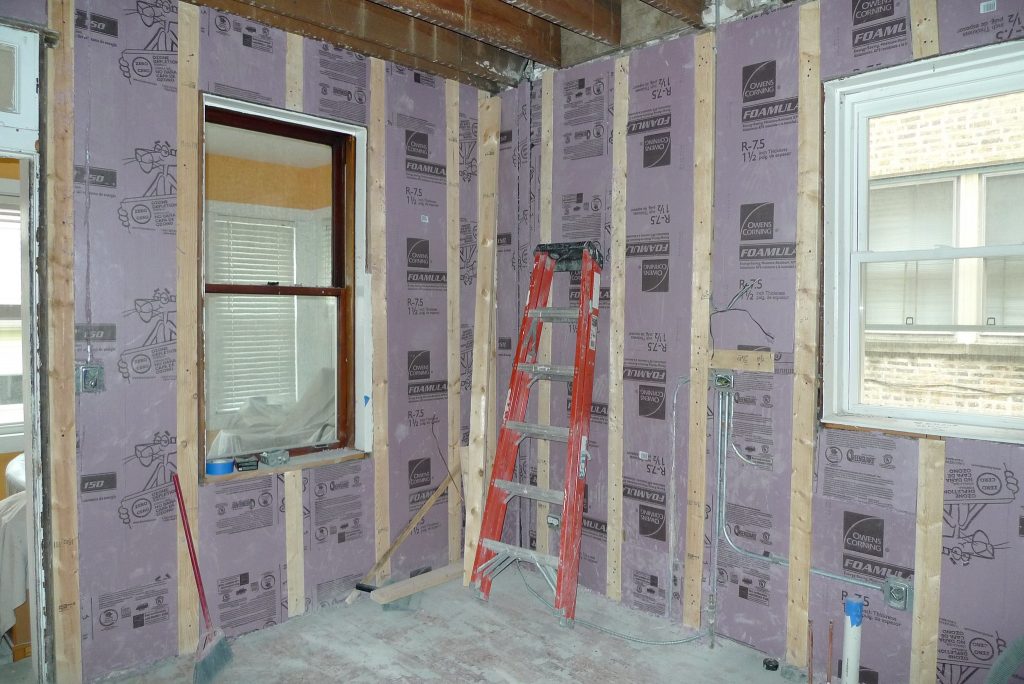Order of Steps in a Kitchen Remodel
One of the easiest ways to boost the value of any home is a kitchen remodel. But what exactly does that entail and what should one expect to see happen? If you intend to DIY aspects of the remodel then understanding the process takes on additional importance. Even when going solo, you still need to call in help for professional services such as plumbing.
If, like the majority of people, you hand over all responsibility to professionals, you will need to run through some pre-construction steps such as locating, vetting and hiring designers and contractors (or find a design-build firm which handles both the design and construction phases). Beyond this, while you don’t need to undertake any of the work yourself, being knowledgeable about the right way to remodel a kitchen can help you better plan and schedule activities around it.
The 10 Steps of a Kitchen Remodel
2. Rough-In Work Including Framing and Plumbing
Here is the most common order of events for a major kitchen remodel that involves total gutting (a minor remodel would involve fewer steps which would depends on what you change and what you keep – learn the difference) but, keep in mind, each project is unique and a remodeler may have good reason to deviate slightly from the steps below.
1. Tear Out and Demolition
The first step of any kitchen remodel is tear out and demolition. Before you are ready to create a beautiful new space, it is important to demolish and get rid of what’s outdated or worn out. This is the time when you rip out anything you don’t want to keep including walls, cabinetry, flooring, fixtures, or more. Some property owners enjoy handling this phase themselves, but it is usually best to hire a licensed contractor to complete the work. Experienced teams possess the knowledge to avoid plumbing and pipes hidden behind walls or beneath cabinets.
If you do attempt to handle this part yourself, make sure to turn off the water before starting. Also, it is a good idea to have a plan for the remnants, such as a dumpster or a trailer for hauling debris away.

2. Rough-In Work Including Framing and Plumbing
Next in the kitchen remodel sequence is the completion of rough-in work including any framing and plumbing. Think of this step as anything having to do with walls or what goes inside of the walls.
In some cases, this stage can be as simple as moving framing in the walls around a new center island. In large remodel projects, this might mean moving plumbing fixtures feet away from where they originally sat or adding square footage to the space by pouring new concrete for an expansion.
This step is very time-consuming and usually best left to a professional construction crew.
3. Professional Inspection
After you’ve finished the rough-in work, it is time for a professional inspection. In most cases, this simply requires calling the city or county and scheduling an appointment. For some areas, there might be a small fee involved.
If you’ve followed all applicable building codes for your jurisdiction, there shouldn’t be a problem and you can move onto the next step. If you fail? Well, then you learn from your mistakes and move on.
If you’ve hired a professional contractor, they will usually handle both the inspection and the steps to fix any errors themselves. But if you’ve handled the process yourself and did not pass inspection, it might be a good idea to call a licensed professional to help you reach that ultimate goal: the approval to keep moving forward!
4. Finishing the Walls
Once a renovation project passes inspection, it is time to finish the walls. Hang, tape, and finish drywall according to your project plan. This includes any drywall necessary for a countertop bar or other section of the kitchen. If you aren’t skilled in this area, consider hiring a contractor to finish up the process.
This is also an optimum step to add a coat of primer to the drywall, even though you won’t add paint for quite some time. Why? The primer seals the facing paper and protects it against scuffs and scrapes when installing other items in the room. Accidents easily happen when you’re moving bulky cabinetry and appliances into the space, and this keeps it in great shape until you’re ready to add a splash of your favorite color later on in the renovation process.
5. Install Doors and Windows
After drywall, it is time to install any doors or windows. If you’re sticking with the same structure as your old kitchen, you might not have to do anything for this step. Simply take the time to wipe down your old ones with a good cleaner and seal any existing cracks around the windows with caulking to help insulate more effectively.
If you’re adding new doors or windows to the space, make sure to insulate them properly. A vast majority of a home’s energy cost each year comes from lost hot and cold air. Unsealed kitchen windows not only make your space less comfortable, but they could also cost you hundreds of dollars in heating and cooling bills.
You’ll also want to ensure they have trim installed to make cabinet installation more exact. Failure to do so has the potential to create gaps, which might cause bigger problems further on into the renovation timeline.
6. Time for Cabinets and Plumbing Fixtures
Next in the renovation process comes the installation of cabinets and plumbing fixtures. This is also the time for installation of new countertops. In many cases, it is the most fun part of the process as you can finally see the finished project start to take shape and the end is clearly in sight. Just imagine that spacious farmhouse sink you’ve had your eye on for months finally making a grand appearance in your renovated space!
Examples of items that need adding to a kitchen during this time include the sink, faucet, and garbage disposal. This is also a time when some minor plumbing issues might reveal themselves. If necessary, contact a skilled professional for advice or help.
7. Bring in New Appliances
After installation of the cabinets and plumbing fixtures, it is time to add your new appliances. This includes items such as the built-in microwave, stove, refrigerator, and more. If you’re adding luxury items—such as a wine chiller or water filtration system—this is the time to complete these installations, as well.
By this point in the process, your new kitchen is really starting to take shape. If you’re working with a professional contractor, they likely have a checklist or timeline to help determine when the overall project is complete. If you’re attempting the process yourself, sit down and make a list of all outstanding tasks to help keep everything right on track.
8. Install New Flooring
Finally, it is time to install new flooring. This is a bit of a contested step among many home renovation professionals. Some prefer to handle tile or wood installation prior to cabinetry. Others feel it is best to save it for last. And many more opt to make this decision on a project-by-project basis.
If you’ve waited until the end, now is the optimum time to install flooring. Select colors and styles that match your unique taste and style. With so many different options on the market—vinyl, ceramic, wood plank, oh my!—there’s something to appeal to any space.
9. Celebrate Your New Kitchen
Congratulations! The renovation project is complete. Now it is time to sit back and celebrate your beautiful new kitchen. Pour yourself a glass of wine or cook a favorite meal for friends. No matter how much you handled alone or hired a professional contractor to do, you now have a beautiful place to make memories and enjoy.
Ready to start your kitchen renovation project? Legal Eagle Contractors helps Texas homeowners create the space of their dreams. We’ve been remodeling kitchens and all other areas of the home since 1978. Contact us today to schedule your no-obligation project review appointment.






